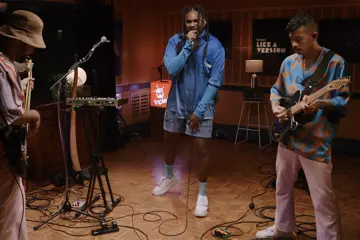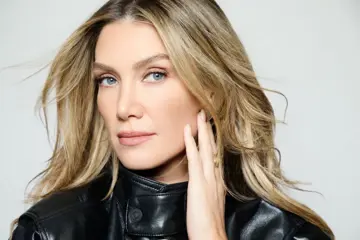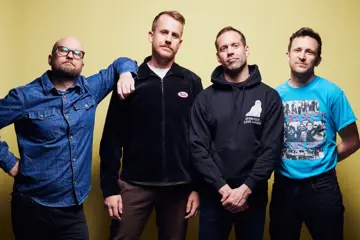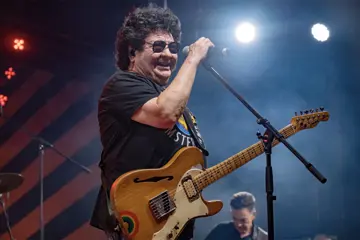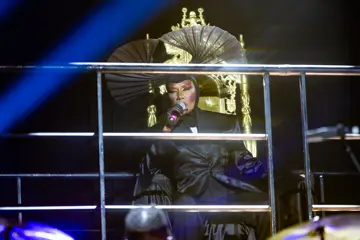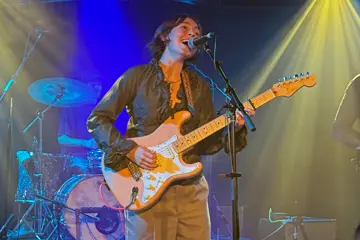For the best part of a decade now, the wonderfully eclectic Mona Foma festival (better known as Mofo) has been transforming Tasmania into a summertime cultural epicentre, bringing left-of-centre and fearlessly avant-garde artists together from all over the planet to ply their trade in performance spaces unlike those offered by any other festival anywhere.
This year's mind-bending array of acts includes a wildly eclectic variety of artists, including Canadian art-rock experimentalists Godspeed You! Black Emperor, infamous Norwegian death metallers Mayhem, American punk-poet Moor Mother, legendary Iraqi cellist Karim Wasfi and UK trans artist/provocateur Genesis Breyer P-Orridge.
Even when names on the bill are of the more well-known variety, they're usually spied in a different context at Mofo: Gotye, for instance, is no stranger to Australian festivals, but here he'll be found paying tribute to French electronic composer Jean-Jaques Perrey. Folk-punk legends Violent Femmes - whose founding bassist Brian Ritchie has been curating Mona Foma since it began a decade ago, these days calling Tasmania home - can also be found amidst this year's festivities, only here they'll be playing alongside a live orchestra. It's a thrilling mix of the known and the unknown, where anything can happen and probably will, and it's rejuvenated an entire island.
"It's pretty exciting to be able to put together these different line-ups every year," Ritchie offers. "We had a different focus this year - we're focussing a lot on people expressing social opinions, protests and also concepts of freedom. Musicians who are free to express themselves are coming from parts of the world where they may not have been able to in the past, or even here in Australia. That was kind of the unifying factor in the choice of the musicians this year, but it by no means indicates that the music is going to sound the same or that there's any particular musical style that's being represented.
Don't miss a beat with our FREE daily newsletter
"It just seemed like the right time for that focus, with all the bad things happening in the world, and with the uncertainty and anxiety and governments taking away freedoms from the people. And also the contraction of the music business: right now the commercial music business is more controlled than it's ever been. Of course, people have a lot of outlets with the internet and they have their own websites and everything, but if you actually focus on the music that you hear in that environment on the commercial radio stations it's more formulaic probably than it's ever been."
Which is why Ritchie and his cohorts strive to offer something completely different from the norm, with a prevailing focus on artistic rather than commercial considerations.
"Well luckily we're associated with MONA [the Museum of Old and New Art] so from the beginning of the festival, ten years ago, we've always thought, 'Well, what's worthy of a museum presentation?' We don't just do any old thing because it's in the charts or it's a buzz or it's trendy or something like that. We've got to take a somewhat longer view if you're presenting it as an art experience," Ritchie explains.
"And then we also have a lot of collaborations between dance performers, performance artists, sound installation artists and spoken word along with music - rap and hip hop is a good example of that too, the blending between the spoken word and music - so you take all these different elements and you put them together as an experience and it's really an eye-opener."
For many years - rightly or wrongly - Tasmania suffered from its reputation as a cultural backwater, a viewpoint that's been eroded almost completely since the advent of Mofo in 2008 (as well as it's annual winter incarnation Dark Mofo) and the subsequent founding of MONA by David Walsh three years later.
"Well, ten years ago when we started Mona Foma we had a goal, and it was actually like a ten-year plan to get people to listen to music and experience different kinds of presentations," Ritchie explains. "For example, we use performance spaces ranging anywhere from one audience member up to about 5,000. It's not all just focussed on maximum audience impact, so we use all different kinds of performing spaces.
"We're doing it in Hobart and Launceston this year for the first time, and we're working with QVMAG [Queen Victoria Museum and Art Gallery]. We're basing our big day up there at that other museum in Launceston, and they've got a whole different range of performance options as well, so we're able to duplicate or create a similar experience up there. It was always part of our agenda to lead and to try to be influential, and to try to give opportunities to people who might have been on the margins of the musical and artistic world."
Spreading the festival from Hobart to Launceston is quite an ambitious undertaking, given how entrenched the state's internal north-south division has traditionally been. "Yeah, when I first moved to Tasmania people warned me about this north-south rivalry and I thought, 'That's absurd!' Then I reflected on Germany being divided and also the United States having the Mason-Dixon Line, but this is worse!" Ritchie laughs. "That's part of the fun. I'm from the outside world, so hopefully they can trust me and have an open mind about it, but it's an interesting phenomenon and nobody's really cracked it yet so we're going to give it a go."
One of the great joys of Richie's time curating Mofo has been the opportunity to give exciting new talents a platform, and more established acts the chance to experiment. 2018's program is no exception. "I think Jamila Woods is an artist who's going to break in the near future," he enthuses. "She's got the old soul vibe and the jazz vibe but she also has spoken word and protest elements and she's got a lot of things to say, she's a very creative artist. Moor Mother is in a similar vein: she's more like the harder edge of the same basic impetus, she's a fascinating artist. We've got wonderful things happening with Godspeed You! Black Emperor: in Hobart they're going to play stuff from their new album [Luciferian Towers] which is quite a good listen, and then in Launceston they're doing different music with the Holy Body Dance Tattoo which is a dance company from Canada, so they're actually doing live music for this incredible dance work. This is the kind of stuff that Mofo thrives on, mixing together the different art forms to create a unified whole, so I'm quite excited about that.
"Chakam Ensemble is an all-female band playing traditional middle-Eastern music, so you don't get a chance to hear stuff like that very often so I'm excited to do that. But you know, it's like asking, 'Who's your favourite kid?' I love the whole program, and we never know what's going to really pop out because we specialise in artists who a lot of them have never been to Australia before - I wouldn't have seen everybody and you just don't know who's going to be the standout performer every year. It's a surprise."
Ritchie concedes that while it's exciting to be tasked with curating this diverse line-up each year, it's also a thrill to be able to take artistic risks of this magnitude. "David Walsh has an equal love of music as he has of art, and for him to give us this platform to do this is a blessing," he offers. "It's changed perceptions of Tasmania. People didn't used to necessarily know what to think about this place - so it's definitely raised the self-esteem of the public here. Even stuff like the culinary scene has boomed because of Mona - the tourism element of what we do brings a lot of people to the island and that allows for more business opportunities for everybody and more creative opportunities as well."
Of course, Ritchie is also involved in the action himself this year, and is looking forward to revisiting the Violent Femmes stripped-back canon in a completely foreign musical vernacular, courtesy of the Tasmanian Symphony Orchestra. "It happened very organically because Tim Jones who's the tuba player in the orchestra also plays with the Femmes' horn section quite frequently, and he's writing the arrangements for the orchestra," Ritchie tells. "So here's somebody who's played with us, plays with the orchestra and knows how to orchestrate music, and also with the Femmes being a predominantly acoustic band we can meet them on their terms, compelling them to try and meet us on our terms. Most rock bands would blow off an orchestra with their amplifiers, but we're prepared to back off on the volume and actually play almost at the same volume as the orchestra musicians and create a more unified approach that way.
"Usually at a Femmes show I just call the set, but in this case because we're orchestrating things we can't spontaneously throw things into the mix so we're going to prepare a set: it will be a lot of the favourite Femmes songs with added orchestration and then a few odd tracks that are more like deep cuts, but it will span the whole range of our creative history."





